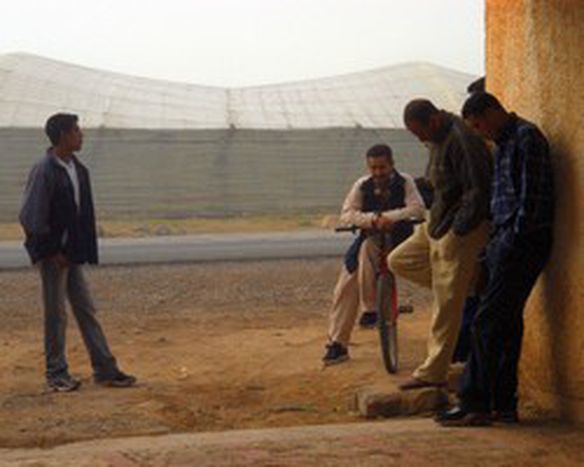
'Blue card' to regulate European immigration
Published on
Translation by:
 jessica adler
jessica adler
On 23 October EU Justice Commissioner Franco Frattini proposed a 'blue card', aka the US 'green card'. Holders would be allowed to work in an EU member state for two years without moving to a different country
'I do not believe that immigrants in Europe want to be a convenient source of cheap labour,' said Mohammed Yasser Boubekri, who heads the National Collective in Support of Citizenship and Democracy ('Colectivo Nacional de Apoyo a la Ciudadanía y la Democracia') in Tetuan. Tetuan is the first major Moroccan city that you come to on leaving the Spanish-owned city of Ceuta, from where the Spanish flag can be seen flying from Ceuta’s Portuguese-built city walls.
Boubekri was referring to a comment by 'a European minister who, last year, made a reference to the convenient, cheap labour pool that immigrants provide in his country,' and to the Eurochamber's approval of the idea that the main motivation for the blue card would be its practical uses.
Solution to mass regularisation
The card, like the US green card, could give rise to the 'blue card', allowing immigrants to work in an EU country for two years. At the end of this period, they would have the right to move to another European country. The aim is to attract skilled workers from outside of Europe, since Eurostat calculates that, in the IT and communications sector in the EU alone, there are around 300, 000 vacancies. The stated objective is 'to put the brakes on illegal immigration', as Franco Frattini, EU Commissioner for Freedom, Security and Justice, announced in Portugal on 14 September.
The fear that immigrants will become a convenient source of cheap labour at the beck and call of Europeans clashes with the European enthusiasm for the card. This counters the trend for large-scale standardisation, rejected by the Eurochamber as useless (which is a rap on the knuckles for Spain). It imitates the US formula, which can be summarised in three points: it reduces the rate of illegal immigration, acts as a counter-measure to an ageing population and fills a gap in the workforce. It is also worth noting that, according to figures from the European Commission, 55% of skilled immigrants go to the USA while only 5% come to Europe.
Recent studies talk of the need to increase the volume of this workforce in Europe. The EU will need nearly 20 million immigrants over the next decade, a figure which Franco Frattini refutes categorically.
Risk of objectifying immigrants
Another, rather different idea is that proposed by Yasser Boubekri in Tetuan: 'The path taken by immigrants must always be decided by the immigrants themselves. They must form a network of immigrants - a representative body or commission - and there must be a guarantee that not only will they be able to work in Europe, but that they will also be able to vote and to reap the benefits of living in a democracy.' In any case, 'the possibility of living in a European country' stands out as a benefit for this activist. Nevertheless, he asks, 'What will happen when the employment contract comes to an end? What would happen if an immigrant who had settled in France, for example, found a new employer in Germany? Would he be able to change jobs and move to another country?'
For now, the proposal is just that. Countries such as France and the UK, which are toughening their immigration policies, have not given their approval. German conservatives flatly refuse to discuss the blue card.
With regard to the negative press surrounding immigrants, Yasser is sceptical: 'The concept of the immigrant, in its derogatory sense, will not disappear,' he states. 'The immigrant will continue to be the victim of a language which reduces him to no more than a term; which objectifies him as nothing more than the subject of debate in public opinion, but does not give him the right to offer his own opinion on himself, his personal baggage, his identity, etc.' As he understands it, the risk is that 'Europeans will forget that immigrants have feelings and can suffer, and will only value them as a potential workforce - or as forced labour, depending on your point of view.'
Photo homepage: (Poppyseed Bandits/ Flickr)
Translated from Una tarjeta azul para arbitrar la Europa de los inmigrantes


